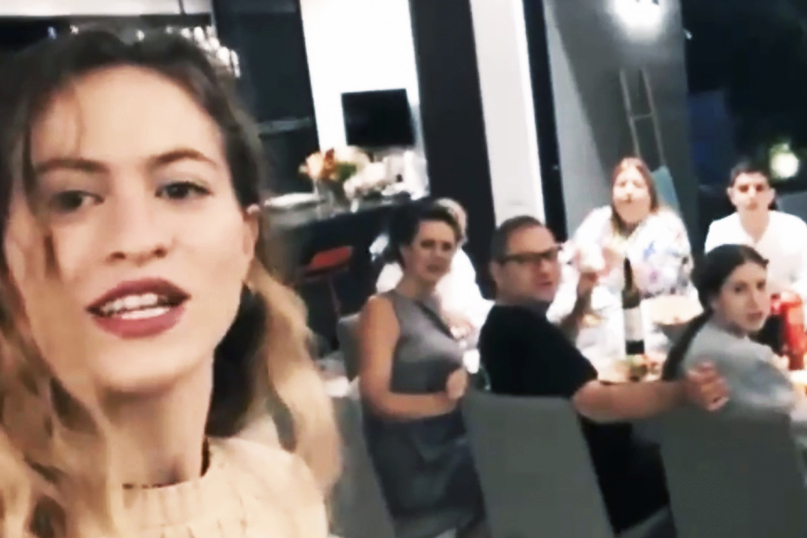
By Stacey Dresner
Every August since 1999, groups of young people from the Afula-Gilboa region of Israel have arrived in Southern New England to share their love for Israel – the land, the people, the culture – with local Jewish communities, as part of the Jewish Agency for Israel’s Partnership2Gether Young Emissaries program.
Sponsored by the Southern New England Consortium (SNEC) – made up of the Jewish Federations in Connecticut, Western and Central Massachusetts, and Rhode Island – these 18-year-old emissaries from Afula-Gilboa, SNEC’s sister region in Israel, delay military service in the Israeli Defense Service (IDF) for a year while they live with local host families and perform outreach in day schools, religious schools, youth groups, synagogues, Jewish Community Centers, and nursing homes. Their goal: to strengthen the connection between Israel and local Jewish communities.
But that connection was cut short in March when the 2019-2020 Young Emissaries were sent home three months early due to the spread of Covid-19.
By August, when the incoming 2020-2021 emissaries would have landed in New England, the program had been cancelled for the year.
“The process has already started for the selection of Young Emissaries for arrival in August 2021, but I think some communities have already been questioning whether that’s going to happen,” says Sharon Reisman Conway, who is retiring as the longtime coordinator of the Young Emissary program. “If I were to guess, I’d say we’re going to have another year on hiatus.”
But all is not lost. As we’ve all learned, when activities can’t be held in person, the next best thing is Zoom.
On Friday, Nov. 13, several Young Emissary alumni from 2016-2017 put together a “mini-Kabbalat Shabbat” presentation on Zoom specifically for students at Ezra Academy in Woodbridge and Solomon Schechter in New London, as well as almost 100 individuals from other SNEC communities.
“They say the goal of the Young Emissary program is creating a living bridge between the two Jewish communities – Israeli Jewry and Diaspora Jewry,” says Aviv Ziv, a 2016-2017 Young Emissary in Springfield, Massachusetts, who participated in the Zoom program. “I think the Kabbalat Shabbat proved this bridge is still there, and it’s there to last.”
Conway says the idea to bring the emissaries back to their communities via Zoom was a no-brainer.
“I think it was sort of a synthesis of everybody saying, ‘what are we going to do? How do we keep this alive?’ Because this year we don’t have the personal connections that really is the magic of the program,” explains Conway. “So, we thought it would be great if we could come up with something that would at least give us some of that connection.”
Conway said there were two goals when planning to reconnect with the Young Emissaries.
“One was to see if we could develop a bank of videos of activities that would be available to various communities to use in their virtual Hebrew schools and virtual day schools, or even as a community interest program. And the hope was also to do live experiences. That was what we did [on Nov. 13] with the mini-Kabbalat Shabbat,” she says.
Aviv Ziv and Guy Carmi, who served as a Young Emissary in Eastern Connecticut in 2016-2917, helped to coordinate the Zoom program on their end after Conway told them that the Young Emissary program had been cancelled this year.
“Aviv and I contacted the other emissaries and sent them a message on our WhatsApp group chat,” Carmi explained. “We explained to them the plan for the event and they were all excited to join. This was an amazing opportunity for all of us to reconnect with our communities. I wanted to do it because especially in a year like this, where the communities have no emissaries, it is so important to strengthen the ties between Israel and our friends from Connecticut.”
The group of former emissaries – all from 2016-2017 – sent videos showing how they celebrate Shabbat. Some showed their families gathered around the Shabbat dinner table, some sang songs and recited the blessings.
The live Zoom presentation took place as Shabbat was set to begin in Israel; it was early afternoon in Connecticut so that day school students from Ezra Academy in Woodbridge and Solomon Schechter School in New London could participate.
“It was very nice,” reports Conway. “We had a lot of community members who joined in and I think people felt it was a feel-good experience, both seeing everybody and kind of reminding ourselves that the connections are still very much alive… I got a lot of feedback from the Emissaries saying how meaningful it was for them to be reminded that the relationships still are very vital and connected.”
‘We are always your Young Emissaries’
Last March, when the last batch of emissaries was sent home early and the next group was cancelled, several Young Emissary coordinators began working on ways to keep the connection to Israel going in their communities.
Marcia Reinhard, the coordinator for the Jewish Federation of Eastern Connecticut, spoke with several of her past emissaries who she reports were happy to do Zoom programming this fall.
“They are all about this,” Reinhard says. “One of the messages from an emissary said, ‘Who better to keep you connected to Israel than your emissaries? We may have left you but we are always your emissaries.’”
So far this fall, several emissaries have Zoomed with members of the Eastern Connecticut Jewish community.
Amit Horowitz, a 2015–2016 YE alum, did a zoom program for the students at Solomon Schechter in New London.
“She knew everyone of those kids because they were in kindergarten when she was here, and they remembered her. It was an amazing reunion,” says YE coordinator Liz Baker.
Eastern Connecticut YE Roy Sulemani (2018-2019) did a Zoom “Café Israel,” a pop-culture Hebrew conversation program with Mitchell College Hillel. In early November, Bar Halgoa and May Abudraham (YE Eastern CT, 2013-2014) did an adult Café Israel – dinner and discussion for about 35 viewers; Guy Farmi (who helped organize the Kabbalat Shabbat) played a Zoom “Family Feud” game with Eastern Connecticut’s Jewish Community High School students; Eastern CT YE Ron Peleg, organized an Israel geography game with the teens; and Hadar Elya, an Easter CT emissary from 2009, who had just given birth, did a program with Solomon Schechter students, teaching them the Hebrew words for various animals.
Reinhard also came up with the idea for her past emissaries to write ‘were are they know’ articles for the Jewish Federation’s newspaper.
“Our emissaries write about their year with us, their military service after that, then their travel after their service, the university and what they studied, how they met their significant other, if they got married, children, what they are doing now and if and how the year impacted their lives going forward,” Reinhard says of the articles that began appearing in the Federation’s newspaper on Sept. 11.
Liz Baker coordinator of the Western Massachusetts Young Emissary has also kept a connection going with her past emissaries.
One of her emissaries, Tamar Melech, made a video of herself shopping in the market in Carmel for shakshuka ingredients. She then demonstrates how to make the dish in her own kitchen.
“It was fantastic,” Baker says. “She was in the Carmel shuk and I felt that you really get a great feeling for what the shuk is. She wasn’t just touring the shuk, she was buying groceries for a specific recipe. Then she went home and did the recipe very clearly. It was extremely well done.”
That video is now in the bank of videos available for any Hebrew or day school in any of the SNEC towns.
“We have about 15 videos in the bank. We are trying to solicit more,” Conway says.
But soliciting past emissaries is not always easy, despite their enthusiasm. Some of them are now serving in the IDF and many are busy with demanding careers and families of their own.
“We have somebody who is working as a lawyer in the Israeli Supreme Court; we have doctors, political organizers. I think the problem is they’re into it, but they’re all so busy,” Conway says.
To make things a little easier for the extremely busy emissaries, Conway, the coordinators and emissaries are working on a Milat Hayom or Hebrew ‘word of the day’ program. Emissaries will make 30-second videos teaching a new word of the day. The videos will be available in January.
For now, as communities are deciding whether or not they will commit to the Young Emissary program for the year 2021-2022, these virtual programs will have to do.
Conway says while it is disappointing not to have the emissaries here in person, she realizes there are more pressing things to be concerned about.
“I think of things like hierarchy of needs,” she says. “I mean when we’re talking about people losing jobs or being worried about their personal health or their family’s health, it’s kind of a luxury to be thinking about deepening our connections with Israel. Although, in fact, I don’t think the Young Emissary program is any less important, given all that’s going on in the world and the concerns about rising antisemitism and hate.”
Sharon Conway to step down as Young Emissary coordinator
For the past 16 years, the Israeli Young Emissaries have called Sharon Reisman Conway “Mama Sharon.”
This fall, Mama Sharon will retire from her position as coordinator of SNEC’s Young Israeli program.
“It’s been 16 years and it’s just time for my next chapter,” says Conway, who lives in West Hartford.
Conway became director of the program in 2004 after its first coordinator, Rabbi Andy Hechtman, left. She had become familiar with the Young Emissary program while serving as chair of Hartford community shaliach Asaf Ron’s Israel committee.
“Asaf was helping Andy, so I got to know a lot about the program. I often said to Andy, ‘If you ever thinking of quitting, let me know because this could be a really fun job.’ The kids are really stimulating and interesting, and I could spend time in Israel.”
Conway came to love Israel after her first trip there as a teenager. She went with her family one summer when her father was on a sabbatical.

“I spent a summer on a kibbutz and then kind of fell in love with the country,” she recalls. “Then after college, I did a gap year kind of similar to what these [emissaries] do when they come here except I did it in Israel.
“I did volunteer work in the community with the Department of Welfare with families that have children who were developmentally disabled. And I lived in an apartment with other American girls. We didn’t have host families but there were families in the community who sort of were our connecting point. It was a life changing experience for me. It was at that point that I thought maybe I was going to stay and live there, but I determined ultimately that it was too big price to give up my close connection with my family.”
Years later, when her own children were teenagers – “and they needed me less” – Conway took the position as Young Emissary coordinator.
“In many ways, this was the perfect job for me. It would keep me connected to Israel and would allow me to speak Hebrew, which I do. And even though I wasn’t able to move to Israel this was giving me the opportunity to deepen my connections with Israel and travel there.”
Indeed, Conway travelled to Israel every year since taking the position to participate in interviewing and selecting the candidates.
As she prepares to step down, she speaks proudly of all of the young Israelis she has helped nurture over the years.
“I’m still in touch with such a huge percentage of them. Every day I hear from somebody; they send a baby picture or ask ‘Could you please be a reference for me for medical school?’” she says. “They are all in various careers and doing interesting, exciting things.
“For me, one of the greatest rewards is seeing how each of the emissaries personally developed and changed and to watch them basically grow up with the pride of feeling that they contributed in a meaningful way, which all of them did.”
Main Photo: Noa Feldman, Upper Fairfield County young emissary (2016-2017), shared her family Shabbat dinner with snec friends, as part of the Young Emissary “mini-Kabbalat Shabbat” presentation.








 Southern New England Jewish Ledger
Southern New England Jewish Ledger













